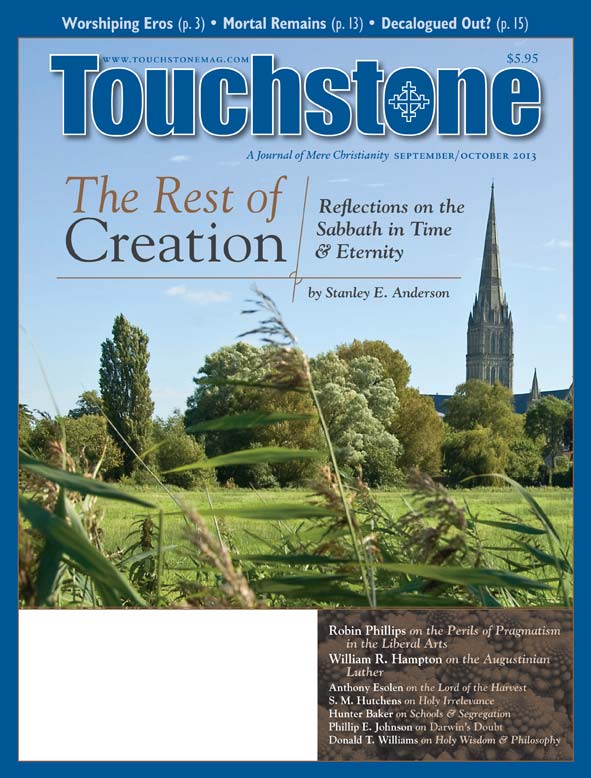Feature
More than Schooling
The Perils of Pragmatism in Christian Attitudes Toward the Liberal Arts
by Robin Phillips
We hear a lot these days about the importance of "worldview education" or "worldview thinking." From a Christian perspective, worldview education can be defined as an education that takes seriously the reality that Christ is Lord over all of life, that there is no field of study that falls outside the scope of biblical categories. Another way to describe it would be to say that worldview thinking hinges on the understanding that Christianity is not just about the religious or "spiritual" side of our existence, but that it provides a framework for viewing every department of life.
It should be clear that, by this definition, true worldview thinking encompasses more than the liberal arts. Nevertheless, this article will deal only with the ramifications of worldview thinking on liberal arts education. I will argue that among those who have understood the mandate for worldview thinking in the above sense, there are generally two ways of approaching the liberal arts. Often these two approaches are unconscious, but sometimes they are more directly explicated. The first is what I call the pragmatic approach, and the second the childlike approach.
The Pragmatic Approach
The pragmatic approach to the liberal arts sees their value as deriving primarily from specific quantifiable ends, such as winning the culture war. According to this mentality, when a Christian is taught the liberal arts from a Christian worldview, he is essentially being equipped with a set of tools. These tools can be defensive (helping the student shore up his faith against the challenge of false worldviews) or offensive (giving the student the intellectual equipment to make gains in the ongoing fight to claim our culture for Christ), but in both cases, they are valued for their usefulness.
According to this approach, we need to study the great thinkers and writers of the past, not so much because the things they said are valuable in and of themselves, but because studying them will give us the brain-power to better defend our beliefs and convince others that the Christian worldview is true.
Sometimes other pragmatic ends are added to this one. A good liberal arts education may be seen as useful, for instance, in helping a student win a scholarship for college or advanced study, get a better job after leaving school, or simply better educate his own children in the future.
The Childlike Approach
The second approach recognizes that a liberal arts education has value for its own sake, independent of any practical goals. Within an education based on the biblical worldview, the liberal arts are worthy of our attention in and of themselves, regardless of any practical utility they may have.
Because this approach reflects the way children instinctively approach learning, I call it the childlike approach. I have never heard a child below age ten ask, "Why am I learning this?" Children will often say that they would rather not learn, or that what we are trying to teach them is boring or uninteresting. But they are eager to learn anything they find interesting or enjoyable for its own sake, and it never occurs to them that the value of a subject lies in its utility. Adults frequently tell children, "You need to study such-and-such because it will help you later in life," but what incentivizes children themselves to learn are things they find lovely and interesting in themselves.

Robin Phillips has a Master’s in Historical Theology from King’s College London and a Master’s in Library Science through the University of Oklahoma. He is the blog and media managing editor for the Fellowship of St. James and a regular contributor to Touchstone and Salvo. He has worked as a ghost-writer, in addition to writing for a variety of publications, including the Colson Center, World Magazine, and The Symbolic World. Phillips is the author of Gratitude in Life's Trenches (Ancient Faith, 2020), and Rediscovering the Goodness of Creation (Ancient Faith, 2023). He operates a blog at www.robinmarkphillips.com.
subscription options
Order
Print/Online Subscription

Get six issues (one year) of Touchstone PLUS full online access including pdf downloads for only $39.95. That's only $3.34 per month!
Order
Online Only
Subscription

Get a one-year full-access subscription to the Touchstone online archives for only $19.95. That's only $1.66 per month!
bulk subscriptions
Order Touchstone subscriptions in bulk and save $10 per sub! Each subscription includes 6 issues of Touchstone plus full online access to touchstonemag.com—including archives, videos, and pdf downloads of recent issues for only $29.95 each! Great for churches or study groups.
Transactions will be processed on a secure server.
more on education from the online archives
more from the online archives

11.5—September/October 1998
Speaking the Truths Only the Imagination May Grasp
An Essay on Myth & 'Real Life' by Stratford Caldecott
calling all readers
Please Donate
"There are magazines worth reading but few worth saving . . . Touchstone is just such a magazine."
—Alice von Hildebrand
"Here we do not concede one square millimeter of territory to falsehood, folly, contemporary sentimentality, or fashion. We speak the truth, and let God be our judge. . . . Touchstone is the one committedly Christian conservative journal."
—Anthony Esolen, Touchstone senior editor













